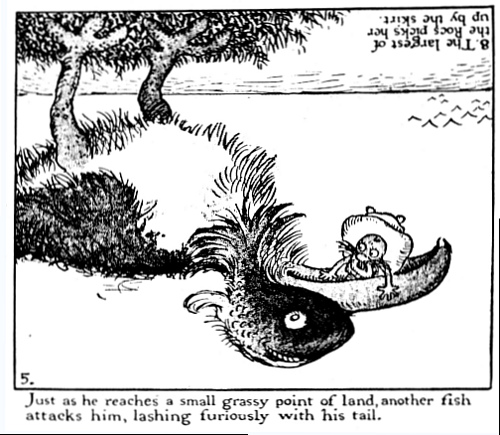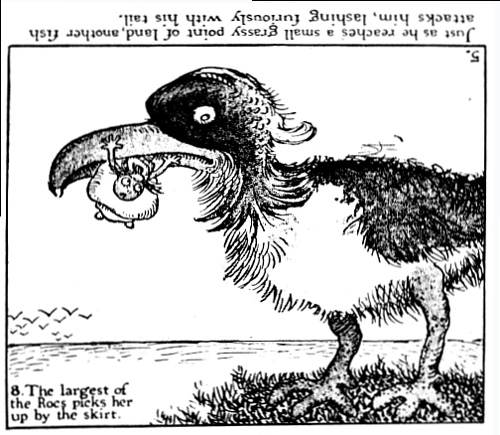Marcus Garvey suffered a stroke in January 1940, woke up to read his obituary in the Chicago Defender, learned that he had been “broke, alone and unpopular,” suffered a second stroke, and died.
Month: January 2008
“A Snake’s Attachment for Home”
Lord Monboddo relates the following anecdote of a serpent: ‘I am well informed of a tame serpent in the East Indies, which belonged to the late Dr. Vigot, once kept by him in the suburbs of Madras. This serpent was taken by the French when they invested Madras, and was carried to Pondicherry in a close carriage. But from thence he found his way back to his old quarters, though Madras was above one hundred miles distant from Pondicherry.’
— Frank H. Stauffer, The Queer, the Quaint and the Quizzical, 1882
Encore!

One candidate for the world’s shortest play is The Exile, by Tristan Bernard.
The curtain rises on a mountaineer in a remote cabin. An exile knocks on the door.
EXILE: Whoever you are, have pity on a hunted man. There is a price on my head.
MOUNTAINEER: How much?
The curtain falls.
But shorter still may be Samuel Beckett’s 1969 play Breath, which lasts 35 seconds. As we view a bare, litter-strewn stage, we hear a baby’s cry, a person inhaling once and then exhaling, and then another cry. At the play’s West End debut, one audience member said, “I just want to put on record that I thought the whole evening was completely bogus and pretentious.”
(Thanks, Adam.)
Outdone
“It is not impossible that in a real dream of sleep, some one may have created an antagonist who beat him in an argument to prove that he was awake.”
— Augustus De Morgan, Formal Logic, 1847
A Bad Morning
On March 14, 1887, Rhode Island evangelist Ansel Bourne woke up in an unfamiliar room. To his astonishment, he found that he was in Norristown, Pa., where he had been running a stationery and confectioner’s shop for two months, calling himself A.J. Brown.
His nephew helped him return to Providence, where psychologists diagnosed a case of dissociative fugue, multiple personality, and amnesia.
Inspired, Robert Ludlum borrowed the preacher’s surname for his novel The Bourne Identity.
Math Notes

In a Word
whelve
v. to cover with an inverted bowl
(Thanks, Ian.)
Roughage
In 1760, was brought to Avignon, a true lithophagus, or stone-eater. He not only swallowed flints of an inch and a half long, a full inch broad, and half an inch thick; but such stones as he could reduce to powder, such as marble, pebbles, &c. he made into paste, which was to him a most agreeable and wholesome food. I examined this man, says the writer, with all the attention I possibly could; I found his gullet very large, his teeth exceedingly strong, his saliva very corrosive, and his stomach lower than ordinary, which I imputed to the vast number of flints he had swallowed, being about five-and-twenty, one day with another. Upon interrogating his keeper, he told me the following particulars: ‘This stone-eater,’ says he, ‘was found three years ago, in a northern uninhabited island, by some of the crew of a Dutch ship. Since I have had him, I make him eat raw flesh with the stones; I could never get him to swallow bread. He will drink water, wine, and brandy, which last liquor gives him infinite pleasure. He sleeps at least twelve hours in a day, sitting on the ground, with one knee over the other, and his chin resting on his right knee. He smokes almost all the time he is not asleep, or is not eating. The flints he has swallowed, he voids somewhat corroded, and diminished in weight; the rest of his excrements resembles mortar.’
— John Platts, Encyclopedia of Natural and Artificial Wonders and Curiosities, 1876
“Book-Larceny”

How hard, when those who do not wish
To lend–that’s lose–their books,
Are snared by anglers–folks that fish
With literary hooks;
Who call and take some favorite tome,
But never read it through;
They thus complete their sett at home,
By making one of you.
I, of my Spenser quite bereft,
Last winter sore was shaken;
Of Lamb I’ve but a quarter left,
Nor could I save my Bacon.
They picked my Locke, to me far more
Than Bramah’s patent worth;
And now my losses I deplore,
Without a Home on earth.
Even Glover’s works I cannot put
My frozen hands upon;
Though ever since I lost my Foote,
My Bunyan has been gone.
My life is wasting fast away;
I suffer from these shocks;
And though I’ve fixed a lock on Gray,
There’s gray upon my locks.
They still have made me slight returns,
And thus my grief divide;
For oh! they’ve cured me of my Burns,
And eased my Akenside.
But all I think I shall not say,
Nor let my anger burn;
For as they have not found me Gay,
They have not left me Sterne.
“Sir Walter Scott said that some of his friends were bad accountants, but excellent book-keepers.”
— Charles Carroll Bombaugh, Gleanings for the Curious From the Harvest-Fields of Literature, 1890
Topsy-Turvy

The great thing about Gustave Verbeek’s comic strips is that when you reach the end of a page, you can invert it to see the story continue.
He created 64 such comics for the New York Herald between 1903 and 1905.

